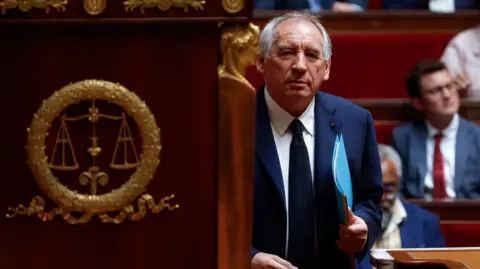France's Political Crisis: The Challenges Ahead
By Graeme Baker | BBC News
François Bayrou, the French prime minister, is set to lose a confidence vote on his stewardship, in the latest twist in a period of chaos inside the National Assembly.
Bayrou, 74, is the fourth prime minister in two years under President Emmanuel Macron, whose second term is office has been overshadowed by political instability.
Bayrou's minority government called for €44bn (£38bn) of budget cuts to tackle France's mounting public debt and is now heading for collapse.
How did we get here?
French President Emmanuel Macron took a gamble in June 2024.
Faced with a bruising loss for his party in the European Parliament vote, he called a snap parliamentary election which he hoped would achieve a clear majority in serenity and harmony. Instead, it resulted in a hung, divided parliament that has made it difficult for any prime minister to garner the necessary support to pass bills and the yearly budget.
Macron appointed Michel Barnier last September but within three months the man who negotiated Brexit for the EU was out - the shortest period since France's post-war Fifth Republic began.
Bayrou is set to suffer the same fate, just under nine months since he came to office last December.
Meanwhile some parties – chiefly on the far right and the far left – continue to clamour for an early presidential election. Macron has always said he will not stand down before his term ends in 2027.
Instead, he will likely have to choose between appointing a fifth prime minister in less than two years - who again risks working on borrowed time - or calling snap elections for parliament, which could result in an even more hostile National Assembly.
Why is France in debt crisis?
Simply put, France's government has for decades spent more money than it has generated. As a result, it has to borrow to cover its budget. The French government says, in early 2025, public debt stood at €3,345 billion, or 114% of GDP.
That is the third highest public debt in the eurozone after Greece and Italy, and equivalent to almost €50,000 per French citizen.
Last year's budget deficit was 5.8% of GDP and this year's is not expected to be 5.4%. So public debt will continue to grow as borrowing covers the shortfall.
France - like many developed nations - is facing the demographic headache of an ageing population - fewer workers being taxed and more people drawing the state pension.
Bayrou has said his piece - what happens next?
If as expected Bayrou loses the vote in the National Assembly early this evening, then France is probably heading for another period of doubt, drift and speculation.
It is possible President Emmanuel Macron will act quickly to appoint a new prime minister – it's certainly in the country's interest that he do so.
Who could replace Bayrou?
If Bayrou falls, pressure will be strong on Macron to name a successor from the left. The last two were from the right and centre, and a left alliance came out numerically top in the 2024 election.
Olivier Faure, the leader of the Socialist Party, would be one possibility. The 57-year-old has a group of 66 deputies in the National Assembly.
However, with all eyes on the 2027 presidential election, would these heavyweights want the electoral kiss-of-death which is to be Macron's next PM?





















